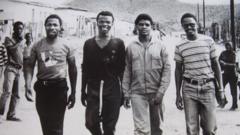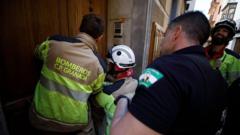Despite a commitment to change, transparency issues linger as the club navigates its response to troubling claims.
Chelsea Football Club Concludes Investigation into Workplace Bullying, Findings Remain Underwraps

Chelsea Football Club Concludes Investigation into Workplace Bullying, Findings Remain Underwraps
The club faces criticism for failing to disclose results of a two-year inquiry into serious workplace allegations.
Chelsea Football Club has quietly wrapped up a two-year investigation into allegations of workplace bullying without revealing the findings, as shared by three sources close to the review. The inquiry stemmed from disturbing accounts within the marketing department, highlighted in a 2022 New York Times article just after the club's sale. The scrutiny intensified following the tragic suicide of a respected former executive, Richard Bignell, raising alarming questions about the workplace environment.
In a letter sent to individuals interviewed in the investigation last fall, Chelsea suggested that issues were identified, yet it did not elaborate on specifics or admit to any wrongdoing. Instead, the letter outlined new safeguarding measures aimed at fostering a more supportive workplace, emphasizing the club's commitment to learning from Bignell's experience. It stated, "Rich’s absence remains deeply felt, and we are committed to ensuring that lessons are learned from his experience at the club," while also asserting that all staff should feel secure in voicing concerns.
In their responses, witnesses requested the disclosure of detailed findings but were met with the club's stance on confidentiality, as articulated in another document seen by The Times and by the three sources. They requested anonymity due to fear of potential negative repercussions on their careers. "This was a robust, thorough process and necessarily confidential to protect the individuals who participated and were impacted," a spokesperson for Chelsea stated.
In a letter sent to individuals interviewed in the investigation last fall, Chelsea suggested that issues were identified, yet it did not elaborate on specifics or admit to any wrongdoing. Instead, the letter outlined new safeguarding measures aimed at fostering a more supportive workplace, emphasizing the club's commitment to learning from Bignell's experience. It stated, "Rich’s absence remains deeply felt, and we are committed to ensuring that lessons are learned from his experience at the club," while also asserting that all staff should feel secure in voicing concerns.
In their responses, witnesses requested the disclosure of detailed findings but were met with the club's stance on confidentiality, as articulated in another document seen by The Times and by the three sources. They requested anonymity due to fear of potential negative repercussions on their careers. "This was a robust, thorough process and necessarily confidential to protect the individuals who participated and were impacted," a spokesperson for Chelsea stated.



















